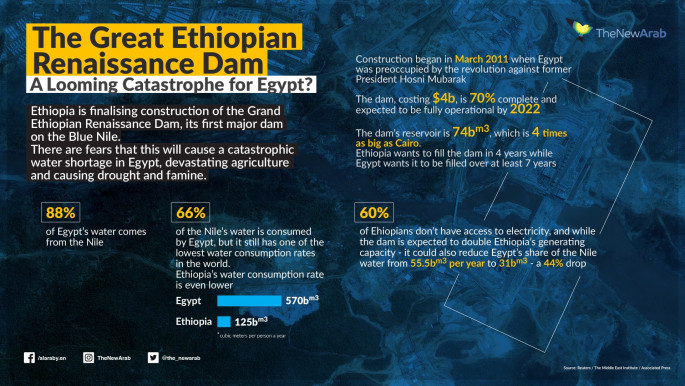"The disputes between the three delegations are of a legal nature especially in terms of a... mechanism for water sharing. Sudan has proposed to refer these issues to the prime ministers of the three countries," Yasser Abbas, Sudanese irrigation and water resources minister, told reporters after the latest round of virtual talks.
No timeline has been set for when the prime ministers would meet as Addis Ababa continues to stick to the July deadline of filling the reservoir of the Grand Ethiopian Renaissance Dam to the consternation of its partners.
Egypt and Ethiopia have not commented on Sudan's proposal yet.
The GERD, set to be Africa's largest hydropower project, has been a source of tension in the Nile River basin ever since Ethiopia broke ground on it nearly a decade ago.
Ethiopia sees the dam as essential for its electrification and development, while Sudan and Egypt view it as a threat to essential water supplies.
"Sudan will not accept the filling of the lake unilaterally before an agreement is reached," Abbas added.
The recent rounds made progress on the technical front but the minister stressed that "legal differences need a political decision by the heads of government of the three countries".
The United States, which has been observing the talks along with the European Union and South Africa, sent a pointed message on Wednesday to Ethiopia.
"257 million people in east Africa are relying on Ethiopia to show strong leadership, which means striking a fair deal," the White House's National Security Council posted on Twitter before the latest meeting.
Washington's involvement in the heated talks began in November after Egyptian President Abdel Fattah al-Sisi put in a request to his ally US President Donald Trump.
Read also: Egypt's Sisi says Trump assured him of further Nile dam mediation
The 6,600-kilometre-long (3,900-mile) Nile is a lifeline supplying water and powering electricity in the 10 countries it traverses.
Its main tributaries, the White and Blue Niles, converge in the Sudanese capital Khartoum before flowing north through Egypt to drain into the Mediterranean Sea.
"Technical issues have been resolved - time to get the GERD deal done before filling it with Nile River water!," the NSC added.
Follow us on Facebook, Twitter and Instagram to stay connected






 Follow the Middle East's top stories in English at The New Arab on Google News
Follow the Middle East's top stories in English at The New Arab on Google News


![22 Arab countries at COP29 have rejected the targeting of fossil fuels [Getty]](/sites/default/files/styles/image_330x185/public/2024-11/GettyImages-2184289638.jpg?h=199d8c1f&itok=ptHl5bec)